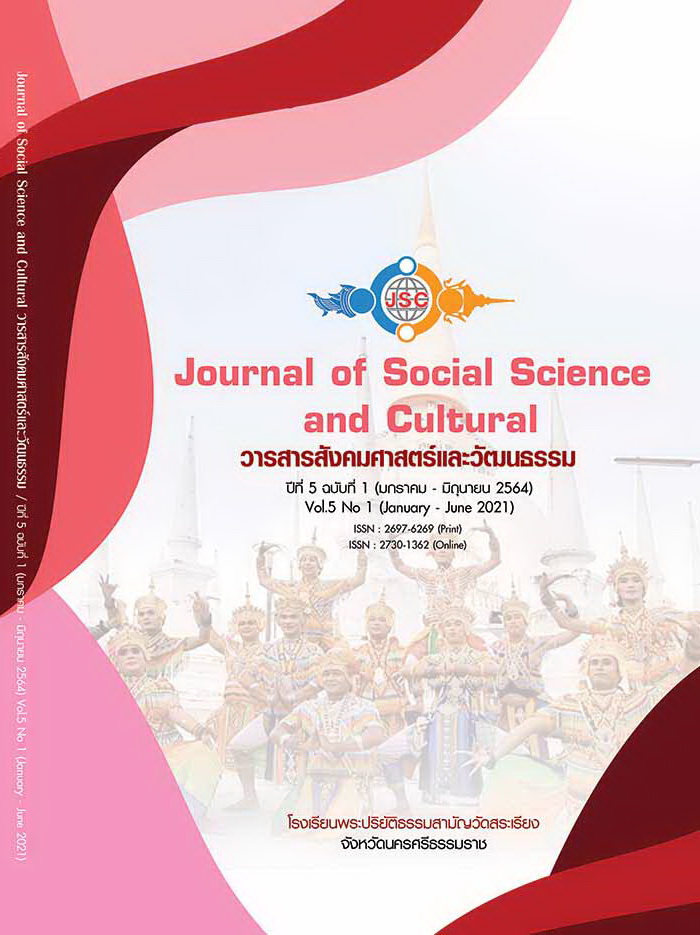PRINCIPLES OF PARTICIPATION IN ADMINISTRATION TO PROMOTE PUBLIC MIND FOR ORGANIZATION PERSONNEL
Main Article Content
Abstract
The quality organization development that means the decision power should not depend on anyone but it should depend on the consensus of people in the organization and people are involved to decision making or participate to suggest an opinion. It indicated that a democratic organization because, if any organization has low quality leader, the management will poor quality too. However, the fundamental qualities of a good leader are broader vision, good organization management ability, human resource development ability, the leadership and oversight to control the quality of operations that including with solving problems within the organization as well. Moreover, the successful management requires four essential resources such as human, money, material and management. Human are the most important resource because they are the users of other administrative factors. For developing quality people is very important that all organization must focus on. Finally, human resource management is the key of organizational management, it is an important factor that leads for according to objectives successful. The human resource management is development of people ability, skills to work, to achieve the most efficient work. The important feature that many organizations are trying to train is consciousness or public mind mean sense of awareness problems occurring in the organization as well as in society and contribute by recognize rights along with duties and responsibilities that can be divided into 3 types: 1) self-consciousness 2) other people's consciousness 3) social consciousness.
Article Details
References
ชาย โพธิสิตา และคณะ. (2540). จิตสำนึกต่อสาธารณะสมบัติศึกษา. ใน รายงานการวิจัย. สถาบันวิจัยประชากรและสังคม.
ประเวศน์ มหารัตน์สกุล. (2545). การบริหารทรัพยากรมนุษย์แนวทางใหม่ . กรุงเทพมหานคร: สมาคมส่งเสริมเทคโนโลยีไทย-ญี่ปุ่น.
พระธรรมโกศาจรย์ (ประยูร ธมฺมจิตฺโต). (2549). พุทธวิธีในการบริหาร. (พิมพ์ครั้งที่ 4). กรุงเทพมหานคร: มหาวิทยาลัยมหาจุฬาลงกรณราชวิทยาลัย.
พระนรินทร์ คำเรือง. (2555). จิตสาธารณะในพระพุทธศาสนาเถรวาท. เชียงใหม่: มหาวิทยาลัยเชียงใหม่.
พะยอม วงศ์สารศรี. (2540). การบริหารทรัพยากรมนุษย์. (พิมพ์ครั้งที 2). กรุงเทพมหานคร: สถาบันราชภัฎสวนดุสิต.
พิเชษฐ์ ศรีสุข. (2558). จิตสาธารณะ: คืนความยั่งยืนสู่มนุษยชาติ. วารสารวิชาการแพรวาการฬสินธุ์ มหาวิทยาลัยราชภัฏกาฬสินธุ์, 2(2), 64-83.
เมตต์ เมตต์การุณ์จิต. (2553). การบริหารจัดการศึกษาแบบมีส่วนร่วม: ประชาชน องค์กรปกครองส่วนท้องถิ่น และราชการ. (พิมพ์ครั้งที่ 2). กรุงเทพมหานคร: สถาบันพัฒนาองค์กรชุมชน.
ยุทธนา วรุณปิติกุล. (2552). สำนึกพลเมือง: ความเรียงว่าด้วยประชาชนบนเส้นทางประชาคม. กรุงเทพมหานคร: มหาวิทยาลัยมหิดล.
รัฐธรรมนูญแห่งราชอาณาจักรไทย พุทธศักราช 2560. (2560). ราชกิจจานุเบกษา เล่มที่ 134 ตอนที่ 40 ก หน้าที่ 1 (6 เมษายน 2560).
วิรัช สงวนวงศ์วาน. (2554). การจัดการและพฤติกรรมองค์การ. กรุงเทพมหานคร: เพียร์สันเอ็ดดูเคชั่น อินโดไซน่า.
วิโรจน์ สารรัตนะ. (2555). แนวคิดทฤษฎี และประเด็นเพื่อการบริหารทางการศึกษา. กรุงเทพมหานคร: ทิพย์วิสุทธิ์.
ศิริกาญจน์ โกสุมภ์. (2542). การมีส่วนร่วมของชุมชนและโรงเรียนเพื่อการจัดการศึกษาขั้นพื้นฐาน. ใน ดุษฎีนิพนธ์การศึกษาศาสตร์ดุษฎีบัณฑิต สาขาวิชาพัฒนศึกษาศาสตร์. มหาวิทยาลัยศรีนครินทรวิโรฒ ประสานมิตร.
สมคิด บางโม. (2562). องค์การและการจัดการ. กรุงเทพมหานคร: ซีเอ็ดยูเคชั่น.
สมบัติ นามบุรี, 2562. (2562). ทฤษฎีการมีส่วนร่วมในงานรัฐประศาสนศาสตร์. วารสารวิจัยวิชาการ, 2(1), 183-195.
สมยศ นาวีการ. (2545). การบริหาร. กรุงเทพมหานคร: ชาญวิทย์เซ็นเตอร์.
เสถียรภาพ พันธุ์ไพโรจน์. (2543). ปรัชญาและแนวคิดในการจัดการทรัพยากรมนุษย์. นนทบุรี: มหาวิทยาลัยสุโขทัยธรรมาธิราช.
อนุศักดิ์ ฉิ่นไพศาล. (2557). การบริหารงานคุณภาพในองค์การ. กรุงเทพมหานคร: ซีเอ็ดยูเคชั่น.
Vroom, V. H. & Yetton, P. (1973). Leadership and Decision Making. Pittsburgh: University of Pittsburgh Press.


